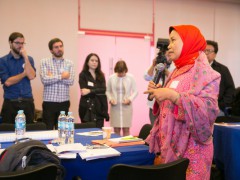Empowering People Workshop Mexico 2014: Sharing Experiences for Social Impact Measurement

Who would have thought that sharing ideas and exchanging cards could be such a useful exercise for driving change? For several years society has adopted traditional approaches for promoting development and we have not seen yet the results we would expect. Could it be that it is time to go one step further and explore new strategies? Perhaps the solution to our shared societal ills is a combination of entrepreneurship, innovation and networking?
The “empowering people. Award” 2013 (initiated by the Siemens Stiftung) made it possible to join a diverse group of social entrepreneurs and innovators with innovative projects that use basic technologies to fulfill people’s basic needs in different regions all over the world. This year, as a sequel of this event, the second “empowering people. Workshop” was hosted in November 2014 Mexico City. This group of social entrepreneurs and innovators have been invited to spend one day together meeting each other, sharing experiences and learning together how to improve and measure the impact of their projects.
At the beginning of the session, the participants were invited to separate in groups based on their origins, then on where their projects were implemented and finally on the previous experience they had with measuring their results. The participants were told to stand to the left if they had a profound knowledge about how to measure and report the impact generated by their projects on society, and go to the right if they were “totally lost.” Immediately the left side of the room was almost empty.
Representing the left side, Margarita Barney from Mexico and Tri Mumpuni from Indonesia spoke about the importance of measuring the impact of projects after at least 5 years to know whether there has been an appropriate transfer of technology and if people accept it. After that, data must be created to check how the project worked, track the results and learn from the outcome in order to know which direction to continue.

Tri Mumpuni from Indonesia speaks to the group during the workshop. Picture taken by Siemens Stiftung.
On the right side, Haron Wachira, Kenyan social entrepreneur explained: “I am here hunting for the tools people are using to measure impacts. We know one, but we cannot use it because it costs even more than our project.” An impact measurement is normally a costly and time consuming action, but at the same time, a necessary initiative in order to solve the “Getting Bigger” question according to one of the panelists, Dr. Robert Kappel from the German Institute of Global and Area Studies (GIGA).
Exchanging experiences could be really helpful for these change makers that were able to, in a quick one day workshop, get to know each other, establish a strong bond and learn from their stories and experiences both about success and failure. Profiles that were radically different, found out that they had common goals and possible paths for collaboration thus opening doors to strengthen their projects and expand their horizons.
Nevertheless, impact measurement wasn’t permanently in the center of the discussion. To tell the truth, the path of social entrepreneurship is so complex and full of obstacles that many other issues came up. Topics such as funding, project management, relationship with governments, and the implications of being a “social enterprise” were also discussed at different times during the workshop.
One of the best examples and most encouraging arguments I heard, came from Dr. Wolfgang Hein (GIGA) and the Indonesian entrepreneur Tri Mumpuni, who agreed on the fact that sustainable solutions require both social and economic capital. To make it simple, this means that financial resources and great technology projects aren’t enough, the people benefited have to make an effort as well and participate in these initiatives in order to create additional value that will stay in the community.
After the event, I am sure most of the participants left the room with more questions than answers, but also with new opportunities, ideas and a great amount of feedback. The seed of curiosity was planted and now it will be their task to learn as much as they can about how to best measure their results and generate data that enables them to generate bigger impacts and increase the reach of their projects. It will be interesting as well to see these organizations grow and keep track of which new paths were opened thanks to this networking and critical thinking exercises.
I could easily continue sharing all of the stories I heard about at the “empowering people. Workshop”, but that would be too long for a blog post. I encourage you to continue learning about these projects and social impact leaders, sharing ideas with them, cooperating with these organizations to make a change. After all, what I took from the conference is that learning together is a thousand times better than learning alone.
Tags: Development, Empowering People Award, empowerment, epNetwork, epWorkshop, impact measurement, Mexico, networking, Siemens Stiftung, Social entrepreneurship, Technology

